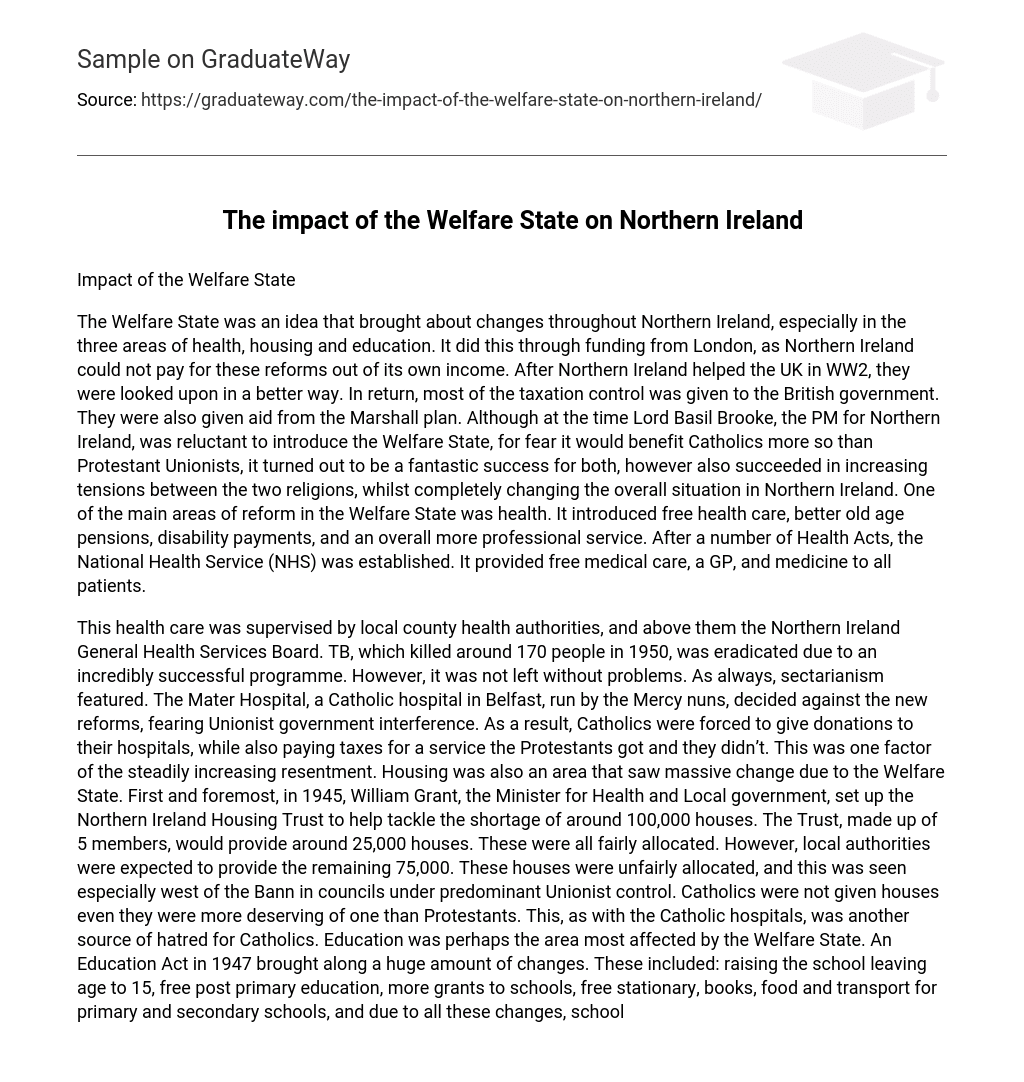The Welfare State was an idea that brought about changes throughout Northern Ireland, especially in the three areas of health, housing and education. It did this through funding from London, as Northern Ireland could not pay for these reforms out of its own income. After Northern Ireland helped the UK in WW2, they were looked upon in a better way.
In return, most of the taxation control was given to the British government. They were also given aid from the Marshall plan. Although at the time Lord Basil Brooke, the PM for Northern Ireland, was reluctant to introduce the Welfare State, for fear it would benefit Catholics more so than Protestant Unionists, it turned out to be a fantastic success for both, however also succeeded in increasing tensions between the two religions, whilst completely changing the overall situation in Northern Ireland.
One of the main areas of reform in the Welfare State was health. It introduced free health care, better old age pensions, disability payments, and an overall more professional service. After a number of Health Acts, the National Health Service (NHS) was established. It provided free medical care, a GP, and medicine to all patients.
This health care was supervised by local county health authorities, and above them the Northern Ireland General Health Services Board. TB, which killed around 170 people in 1950, was eradicated due to an incredibly successful programme. However, it was not left without problems. As always, sectarianism featured. The Mater Hospital, a Catholic hospital in Belfast, run by the Mercy nuns, decided against the new reforms, fearing Unionist government interference.
As a result, Catholics were forced to give donations to their hospitals, while also paying taxes for a service the Protestants got and they didn’t. This was one factor of the steadily increasing resentment. Housing was also an area that saw massive change due to the Welfare State. First and foremost, in 1945, William Grant, the Minister for Health and Local government, set up the Northern Ireland Housing Trust to help tackle the shortage of around 100,000 houses.
The Trust, made up of 5 members, would provide around 25,000 houses. These were all fairly allocated. However, local authorities were expected to provide the remaining 75,000. These houses were unfairly allocated, and this was seen especially west of the Bann in councils under predominant Unionist control. Catholics were not given houses even they were more deserving of one than Protestants. This, as with the Catholic hospitals, was another source of hatred for Catholics.
Education was perhaps the area most affected by the Welfare State. An Education Act in 1947 brought along a huge amount of changes. These included: raising the school leaving age to 15, free post primary education, more grants to schools, free stationary, books, food and transport for primary and secondary schools, and due to all these changes, school attendance rose dramatically. Another large change was the eleven plus exam, which was an exam that pupils sat before going to secondary schools. The top 20% would go to grammar schools for a more academic education, whilst the other 80% would go to state schools for a more comprehensive education.
This was said to be the reason why Catholics, like John Hume, who led the civil rights movements, had the education to know how to stop the sectarian oppression. In 1963, Captain Terence O’Neill, Northern Ireland’s Minister for Finance, took over from Lord Brokeborough. He was seen to be friendlier to Catholics than his predecessor. In 1964, the Robbens Committee from Britain recommended that a new university be set up in Northern Ireland. Since the West of the Bann had escaped any industrial development, it was assumed that the Magee College in Derry, which catered for the first two years of college, would be upgraded to a full college.
After the two years in Magee, students had to go Queens University in Belfast. It was considered a Protestant university. The Unionist government set up the Lockwood committee to investigate where the new university would be set up. Derry assumed it would be them, and did not put up much of a good case. However, Coleraine pulled out all the stops, offering large amount of land, lots of accommodation nearby, and financial support.
The committee were leaning towards Coleraine. Then, to convince them, some leading Unionists from Derry approached the committee to voice their concern over a new university in Derry. They did not want one there, for fear of a large immigration of Catholics. They were later called “Nameless, faceless men”. A University for Derry committee was set up, with John Hume as its head, but it was too late. Terence O’Neill had chosen, on the Committee’s advice, to give Coleraine the new University.
Catholics were outraged. It is obvious that the implementation of the Welfare State introduced hugely beneficial changes to all levels of society in Northern Ireland. By 1965, 110,000 new houses had been built, employment had steadied, education was more refined, and TB had been eradicated.
However, it also gave rise to new tensions between Catholics and Protestants, due to the obvious discrimination from the Unionist government. This reached its peak with the Coleraine University Controversy, which Hume called “the final nail in the coffin”. The new education reforms meant a new, educated and confident group of Catholics had been raised, and it was these Catholics that began the civil rights movements.





